Vet 101: Q & A Chew on This or Not
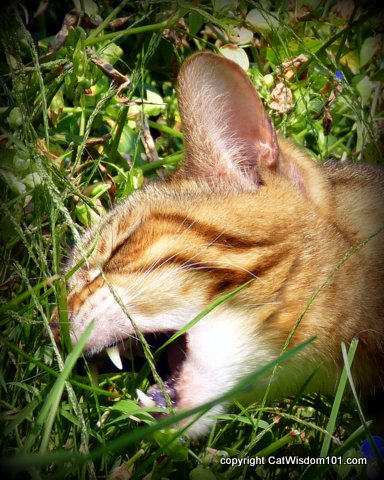
Our vet, Dr. Rich Goldstein digs into the Cat Wisdom 101 mailbag to answer reader questions. This week it’s one familiar to most of us.
Q: I have a spider plant that the girls will chew on. It’s kind of annoying in that it shreds the leaves and the shoots that come off the plant. When I call out the chewers name and say, “No”, they stop but I’m wondering how vital greens are to a cat’s diet. My girls are indoor cats and I usually don’t let them outside. The few times they have gone out into the yard, they are more interested in the sights and sounds and smells than chewing on anything green. Former cats who were indoor/outdoor cats would chew on grass and occasionally throw it up. I remember reading that it settles upset stomachs. Is that true? Should I look into the grow your own oats kits?
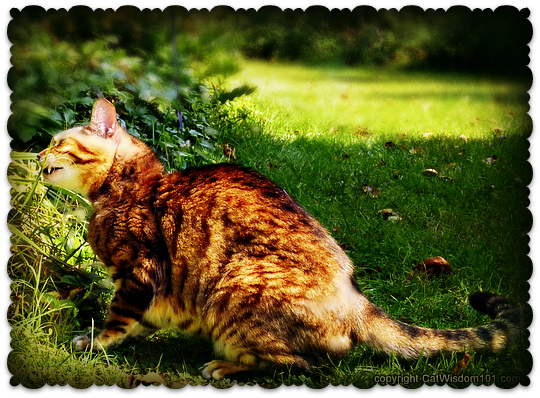
A:“Why does my cat chew on plants?” That’s the second most common question I receive from my feline clients. (The first being, “Why does my cat pee in my husband’s shoe?”) The answer to both questions is, “Ask the cat.” 😉
For years, researchers have speculated on the reasons why cats eat plants. The truth is, we really don’t know why, except that plant-eating is a common behavior among wild and domestic cats. Some have speculated that it may be because the cat feels nauseous, and uses the grass to induce vomiting. But a recent survey of cat owners revealed that very few cats that consumed plants actually vomited. And it was suspected that many of the cats that did vomit the grass had underlying gastrointestinal problems that were aggravated by the grasses, which led to vomiting. Nutritional deficiencies have also been proposed, although no direct connection has ever been established. Since smell is so important to a cat’s dietary intake, perhaps they just like the smell of a nice odorous grass (who doesn’t?)
The latest hypothesis regarding grass eating is that it may be an innate genetic predisposition left over from wild cats. Prior to the invention of deworming medications, it is thought that wild cats purged their intestinal tracts of parasites by consuming plant material. The plants would wrap around the worms, and stimulate the intestine to contract, pushing the worms out of the body. Young cats tended to eat more plants than older cats, which makes sense: young cats with immature immune systems are more susceptible to intestinal parasite infestations than older cats.
While it’s completely “natural” for domestic cats to be interested in grasses, it’s not required for their nutritional health. And if you choose to make grass available, here are some important points to keep in mind:
- Avoid toxic grasses. Generally, oat, wheat, and rye grasses are considered safe for cats when obtained from a reputable source.
- Be very careful of cats that choose to pinch off large pieces of grass. Sometimes they can get lodged in the back of the throat, or even work their way into the nose! (A cat that sneezes after “mowing the grass” may have a piece of grass stuck!)
- If your cat has a medical condition that requires strict nutritional management, ask your vet before allowing your cat to snack on grass. For example, most soils contain iodine, so cats that are being treated for hyperthyroidism with an iodine-restricted diet might be better off without the grass.
- If your cat is vomiting after eating grass, speak with your vet to make sure there is no underlying medical reason that is responsible for the vomiting.
Just like Clint Eastwood, James Dean, Brad Pitt, and all those cowboys, walking around with a piece of grass in your mouth can look really cool. Maybe that’s the real reason cats choose to do it…or maybe those guys saw a cat do it first.
Editor’s note: Spider plants are less toxic than many plants but please check toxicology levels at this ASPCA list
Do you have a question you’d like Dr.G. to answer? Please send it to [email protected] with Vet 101 in the subject line.
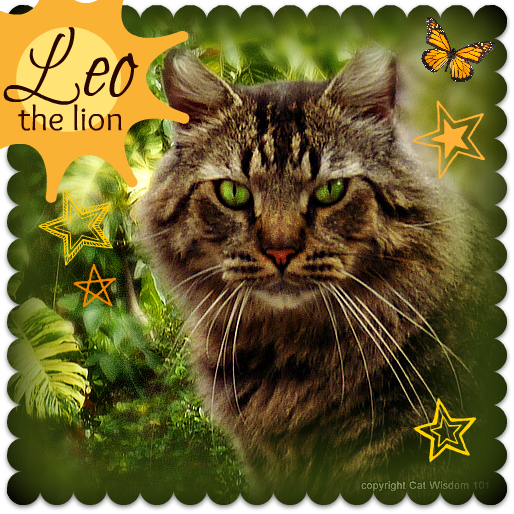


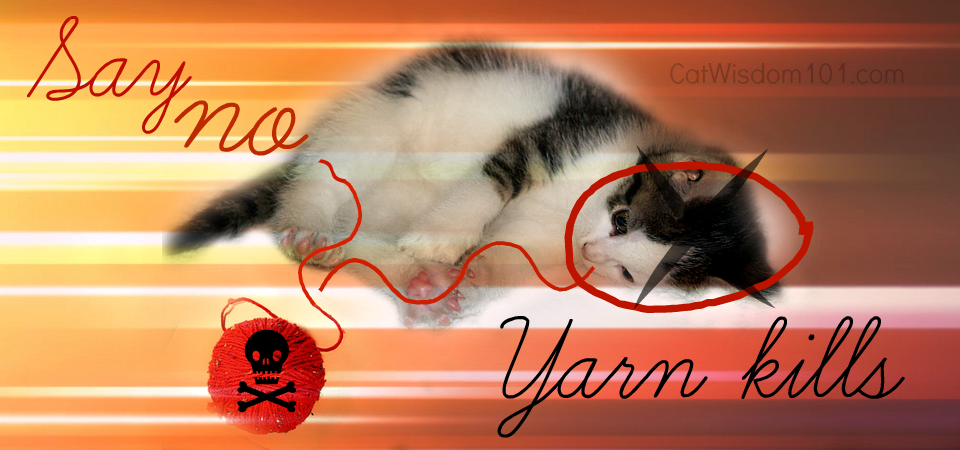
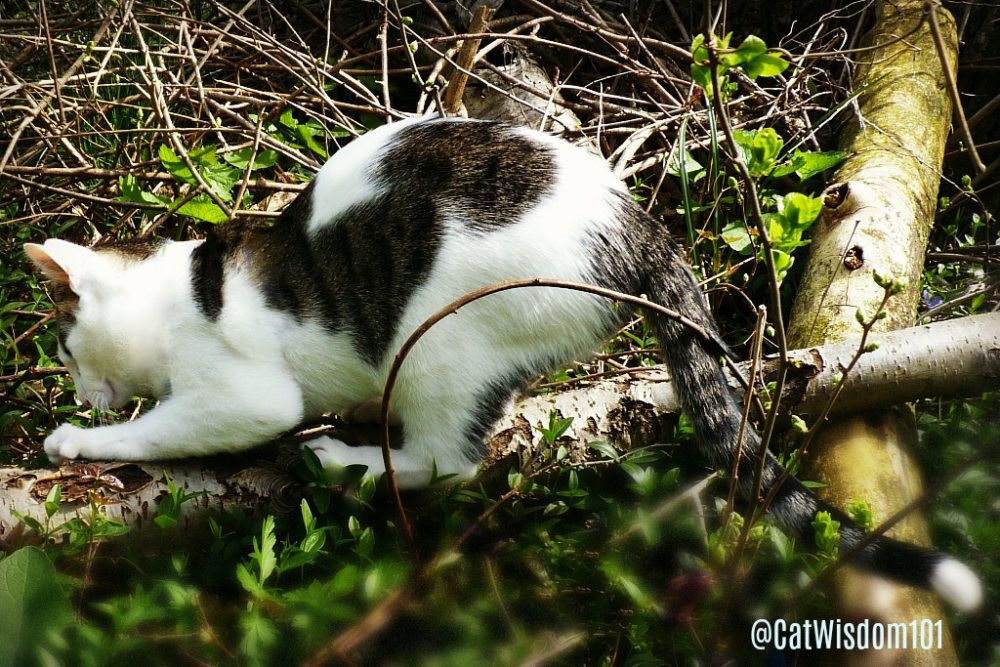
19 Comments
shadow fight 3
Appreciate it for this howling post, I am glad I observed this internet site on yahoo.
garden maintenance brisbane
Mowing the lawn is a very important part of proper yard care. There are a host of advantages that are associated with mowing the lawn that make it well worth it in the end.
Elaine Hutzelman
One of my cats, who is now 16 with numerous medical conditions, has always craved grass. I believe he knows what he wants better than I do, for whatever reason, and 90% of the time, he vomits after eating it. I think it is an intentional act of trying to self medicate, and probably is gastro-related , as now he has GERD and is on Pepcid AC , Reglen, and a probiotic for this condition. I buy organic wheat grass from Whole Foods and hold it out horizontally so he can get a better grip. He would eat as much as I would allow, but I don’t want him throwing up his meds, as he is on Cerenia as well. Even with his arthritis, he manages to scour the floor as soon as I come in from outside, hoping that I might have a bit on my shoes. Obsessed is probably a better word for this craving. I also mix in powered wheat grass with his wet foods.
Texas, a cat in New York
I love to eat grass too. When I was living in an apartment, my human would regularly bring home kitty grass. I was so excited I was jumping around to thank her 😉
Now I have the garden’s grass to eat! Yippie!
Purrs
catfromhell
Mom grows us cat grass in the winter when we start to nibble on her plants. I really enjoy a nice suclent piece of grass and nibble frequently when I am outside in the summer.
Kozmo at the Cat from Hell
Julia Williams
I don’t have house plants so I don’t know if my three would eat them or not. They love to eat grass though…I grow it for them and they mow it down so fast!
Oui Oui
I always thought it had to do with the smell. One cat I had would only eat ferns, and he was as good as any botanist in identifying them. Something about them was different than other vascular house plants I had, and he knew the difference.
meowmeowmans
Great post, Layla. Moosey loves greens, but in the form of LETTUCE, if you can believe it. MOL
Skeeter and Izzy
We don’t touch house plants but love to nibble some of the long tendrils that may spring up between weed eating. Purrs….errr do I have something green between my teeth? Luvs to Dr. Goldstein. Skeeter and Izzy >^..^<
Abby
Ping and Gracie are our two “grassy” eaters.
purrs
>^,,^<
♥Abby♥Boo♥Ping♥Jinx♥Grace♥
Stephanie
Thanks for the information. What Dr. Goodstein said backs up what I found out and wrote about for Examiner. com recently as to my cats’ love for grass and what I did in order to get them to stop demanding to eat the grass outside. Grass is yummy and fun as long as they don’t eat too much of it (barf city!).
CATachresis
Interesting and informative as usual! I’ve seen Austin chew on a blade of grass and often wondered?
Tamago
Both my boys love cat grass! One of them loves to mow the grass and the other lies down on it. I think both of them enjoy the smell. I’m sure these famous actors put grass in their mouth ’cause they saw cats do it!
tincharic
Two of my three are indoor cats only. They don’t often get greens. I do bring in a small handful of cut grass after mowing the lawn. Sometimes they eat it; sometimes they don’t!
Deb n Cats
Thanks for the information. The spider plant is the only one they chew. They are not interested in the geraniums when I bring them inside for the winter. I usually catch them in the morning too, as if it’s akin to my cereal. I’ll look into an oat growing kit if, for no other reason than to make the spider plant look less like it’s been through a shredder.
boomermuse
Is there a way to place the spider plant out of their reach on a high shelf?
Cheysuli
We like Brian’s reply. Gemini likes to go out and chew on grass. I don’t care one way or another. Ichiro has to chew on everything. All our plants get kitty teeth marks on them. The woman has had to resort to the poison control website to be sure none of our plants are terribly toxic–most are just supposed to make the mouth sore, which she says SHOULD deter Ichiro, but apparently he’s a slow learner…
animalartist
Mine have never answered me on this one, no matter how I asked them. And they don’t stop at grassy things, nor at houseplants, but moving on to any plant in the house (plants are nearly all gone now 🙁 ) and even coming over to taste my leaf lettuce and fresh herbs while I’m cooking–like strong and sweet basil, apparently anything green will do!
Brian
We chew because it is there…purrty simple!